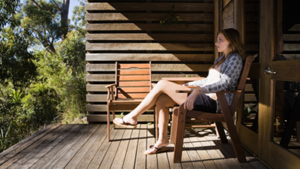
Protect your vacation home from common causes of damage.
Whether it’s a cabin in the woods, a house or condo on the beach or a chalet in the mountains, your vacation home can be a wonderful place to relax and unwind. However, secondary residences require additional precautions compared with your primary home.
An often-overlooked hazard involves water damage to secondary residences that stand unoccupied for extended period.
Homeowners incur thousands of dollars in expenses each year due to damage caused by water escaping from broken pipes, frozen pipes or malfunctioning appliances and plumbing fixtures. Because the home is unoccupied, the problem is often not discovered until major damage has occurred.
You can minimize this risk through the installation of an automatic water shut-off system. These systems all feature a shut-off valve on the main water line entering the home. All are designed to do the same thing: detect a leak in the internal plumbing systems of the home and automatically shut off the water to the home to prevent further damage.
Some systems use time/flow based technology; some use machine learning to understand a household’s usage patterns; and some use sensors located near water heaters, washing machines, refrigerators, toilets or other appliances to detect escaping or leaking water. The system shuts off water to the appliance, preventing costly flooding.
Like any home, a secondary residence can also be vulnerable to sump pump failure caused by power outage or malfunction. Backup sump pumps are now available that do not rely on battery power; rather, they use the home’s water pressure to function.
Investing in these systems can protect your vacation home from extensive water damage, providing you with peace of mind when you’re not there. Additionally, your insurer may offer a discount on your premium when you install a system. Check with your agent for details.
Water damage can also occur when clogged gutters cause winter snowmelt from the roof to back up into the house and through the ceiling. Take care to clean the gutters after all leaves have fallen and before you leave the home unoccupied for the season.
Additional basic techniques can be used to minimize other types of loss or damage:
- Lock all doors and windows upon departure, and consider installing a fire and burglar alarm
- Set up timers to turn lights off and on
- Install motion-sensor outside lighting
- Arrange for someone to check on the property periodically
Techniques such as these can minimize the chance of significant and costly damage to your vacation home, providing peace of mind as you relax and unwind.
This loss control information is advisory only. The author assumes no responsibility for management or control of loss control activities. Not all exposures are identified in this article. Contact your local, independent insurance agent for coverage advice and policy service.
